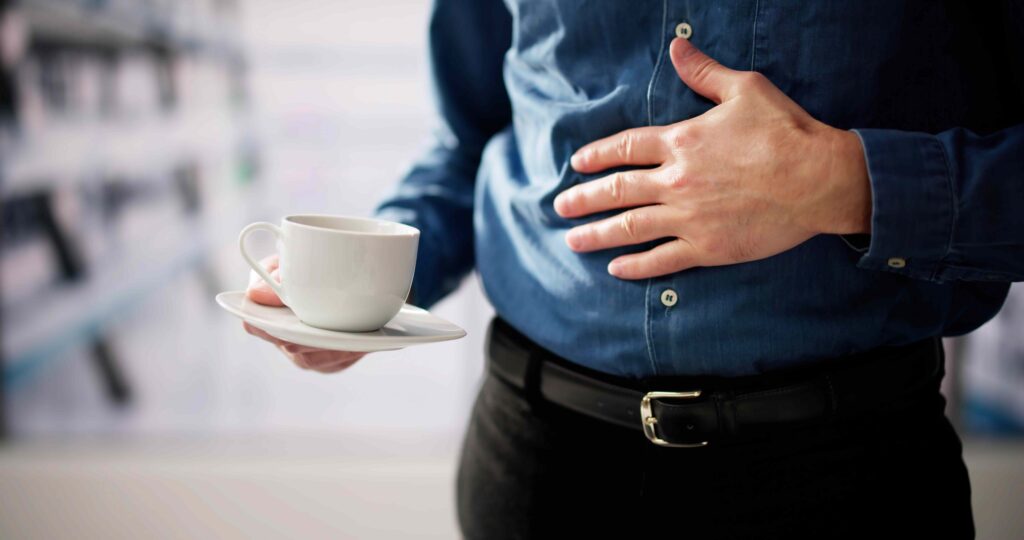Can coffee cause bloating? Short answer—yes. Drinking coffee can increase stomach acid production, making your digestive tract (the tube that carries food through the body) work faster. Some people may experience gas or abdominal discomfort as a result. Drinking less coffee, choosing varieties with a lower acidity, and pairing it with food can help.
There are few things more universal than a nice, hot cup of coffee in the morning. It can offer various health benefits, such as lowering inflammation, boosting your metabolism, and reducing the risk of certain health conditions. However, for some, that morning caffeine comes with uncomfortable bloating that’ll make you think twice before pouring a second cup.
Drinking coffee can cause bloating for a variety of reasons. Coffee is a naturally acidic beverage, and drinking it can affect the acid content in your stomach. This change in acidity can irritate your stomach lining and cause your body to produce more gas. When gas builds up, your stomach tends to feel full or bloated.
Of course, coffee’s effects aren’t one-size-fits-all. Some people are more sensitive than others. Lifestyle choices can also impact coffee’s impact on your digestive tract. For example, drinking coffee on an empty stomach can worsen possible symptoms because there’s no food in your system to help buffer some of the coffee’s acidity.
Other Contributing Factors
Sometimes, coffee isn’t the only thing to blame for your bloat. Other factors that can affect you include:
- Milk: Many people add milk or cream to their coffee. However, people who are lactose intolerant or sensitive to dairy may experience discomfort. If you can’t digest lactose (the sugar in milk), even a small amount can lead to unwanted side effects like gas, bloating, or stomach cramps.
- Artificial sweeteners: It’s common for a lot of people to reach for sugar-free alternatives when making a cup of coffee. However, research shows these sweeteners can be tough to digest and may lead to gastrointestinal (GI) discomfort, such as bloating.
- How you drink it: Consuming coffee too quickly or without food can disrupt proper digestion. Slowing down and being mindful of your coffee intake can make all the difference when trying to prevent coffee bloat.
The way coffee bloating happens can vary from person to person. While most people would describe it as uncomfortable, they may have unique experiences based on their symptoms.
Symptoms of coffee bloating include, but aren’t limited to:
- Feelings of fullness: Your stomach may feel full, even if you didn’t eat many solid foods, if any.
- Feelings of tightness: Coffee bloat may cause your abdominal region to feel stretched or tight. You may even feel pressure in your stomach that stretches your belly.
- Rumbling or growling: You may notice your stomach making rumbling noises as it tries to digest your coffee and any other foods you consumed.
- Flatulence (passing gas): Drinking coffee may lead to extra gas, which in turn can result in more farting and burping.
- Stomach cramps: You may experience stomach cramps due to gas being trapped in your digestive tract.
- Bathroom urgency: Many people feel the need to go to the bathroom soon after their first sip of coffee. This urgent bathroom break can contribute to GI discomfort.
Coffee bloating may start after your first few sips, especially if you haven’t eaten or you add ingredients to your drink that may cause discomfort. It’s important to pay attention to how your body responds to coffee and make adjustments as needed.
A registered dietitian, a healthcare professional with specialized training in diet and nutrition, can help you navigate the many factors that may contribute to digestive discomfort with coffee.
You may be able to minimize bloating and gas if you:
- Choose a low-acidity coffee: Some coffee blends are intentionally made to be less acidic. Lower acidity coffee varieties can be easier on your stomach lining.
- Avoid drinking coffee on an empty stomach: Drink your coffee with food. Eating before or with your coffee can help your stomach tolerate coffee’s acidity.
- Be mindful of sweeteners: For some, artificial sweeteners can be hard to digest and may cause gas or bloating. If you need a dash of sweetness in your coffee, consider using natural sweeteners in small amounts, such as honey or regular sugar.
- Sip your coffee slowly: Gulping coffee down may cause you to swallow air. Sipping it slowly may help prevent bloating.
- Drink enough water: Staying hydrated is important for maintaining a healthy gut and proper digestion.
- Try herbal teas: If the caffeine and acidity from coffee cause uncomfortable bloating, consider trying hot teas. Herbal teas offer soothing properties while satisfying the desire to sip a warm beverage.
- Prioritize gut health: Optimize your gut health to help prevent unwanted GI symptoms. Make sure you’re meeting your fiber needs and include foods that nourish the good bacteria in your digestive system.
Remember that nutrition isn’t one-size-fits-all, and that includes your coffee drinks. What one person may tolerate, another may not. It’s important to be mindful of any symptoms you experience when consuming coffee or caffeine and speak to a doctor or dietitian when necessary.


